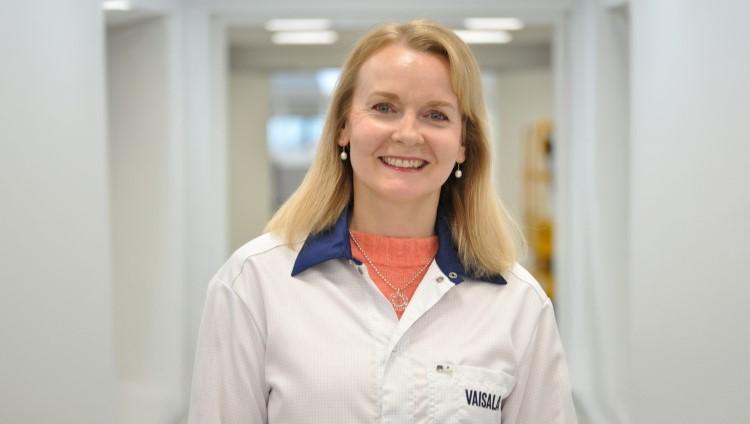Shaping the future of innovation and sustainability with cleanroom technology
Written in association with the Tekniikan Kutsu blog by Uranaisten Opiskelijaseura, this article explores Vaisala’s cleanrooms and their role in enabling high-precision measurements used in climate science, green energy, and beyond.
At Vaisala, innovation and sustainability go hand in hand, guided by the company’s core purpose: Taking every measure for the planet. At the heart of this climate-conscious mission is cleanroom technology that ensures minimal contamination and high accuracy for Vaisala’s measurement instruments, sensing shifts in the environments from wind and lightning to solar irradiation, from temperature to humidity and pressure. But what exactly are cleanrooms, and why are they so essential in today’s tech landscape? The editorial staff of Tekniikan Kutsu interviewed Ulla Bogdanoff, the Director of Vaisala’s Sensor Factory, to find out!
What is a cleanroom?
A cleanroom is a controlled space where the concentration of airborne particles is significantly reduced and continuously monitored. Governed by strict systems that regulate air quality, temperature, and humidity, cleanrooms are designed to minimize contamination. They are largely automated, using advanced factory automation to maintain consistent conditions and to monitor particles, ensuring optimal performance of the products being manufactured.
This controlled environment is crucial for manufacturing semiconductors and other sensitive technologies, where even a microscale particle can compromise product integrity. Industries that demand high precision, like pharmaceuticals and emerging fields like quantum technology, rely on cleanrooms for production consistency and quality. At Vaisala, cleanrooms support the creation of key products like humidity, gas, and pressure sensors. Those sensors are powering, for example radiosondes, that are launched into the atmosphere to collect critical weather data.

Pioneering the path to sustainability
Vaisala’s products provide precise measurements that help its customers to optimize processes, cut emissions and reduce carbon footprint. For example, Vaisala’s humidity measurement technology, HUMICAP, first developed in cleanrooms in the 1970s, was a groundbreaking innovation that set new industry standards. Today, this technology continues to evolve, delivering reliability and stability crucial for sustainable manufacturing and environmental monitoring.
Technology produced in Vaisala’s cleanrooms contributes to green energy and climate science applications. The data captured by Vaisala’s sensors helps track extreme weather events and enables industries to make data-driven decisions that support climate action. Vaisala’s technologies also enhance for example wind and solar energy life cycles, critical carbon capture processes, and fuel cell manufacturing. By ensuring high-quality data and long-term reliability, cleanrooms allow the company to support its customers in meeting their sustainability goals, making Vaisala a key partner in global environmental leadership.

Careers in cleanrooms: building a future in high-tech
As industries evolve, the demand for clean-manufactured technologies continues to grow. The cleanroom sector is expanding, with both startups and established companies exploring fields like quantum computing and nanomaterials. For professionals or tech-savvy students, cleanrooms offer an exciting opportunity for continuous learning and hands-on experience.
Cleanrooms require specialized expertise across various disciplines, from process development and automation to data management and quality assurance. Professionals with backgrounds in materials science, semiconductor electronics, chemistry, and quality control are all essential for maintaining these high-tech environments. At Vaisala, cleanroom teams include process engineers specialized in semiconductor technologies, equipment, sensor products and quality control who drive advancements in product quality and production efficiency e.g. through data analytics and automation.
Vaisala’s sensor factory in Vantaa is located under the same roof as the R&D team, logistics, Weather and Instrument factories, and many other company’s key functions. This setup enables rapid problem-solving, accelerates product development, and fosters a culture of agility and efficiency - qualities that define Vaisala’s approach to innovation. The company takes pride in supporting and mentoring professionals who want to make a difference in both technology and environmental sustainability.
Lastly, Ulla offers an advice for aspiring tech professionals: Internships, project assignments or summer jobs in real-world settings provide insight into different work environments.
"My own career path was shaped by an early internship in a cleanroom setting. That firsthand experience showed me that working in a factory was not what I’d imagined – far from noisy and dirty it was precise, clean, and focused, more like working in a laboratory."
Different experiences in the early stages of career can help you discover roles and environments that resonate with you, offering a perspective that’s often different from academic study. By exploring different types of work roles, you can find your own passion.

Uranaisten opiskelijaseura, affectionately known as UrOs, is a student club based in Tampere. The club aims to highlight the attractive career opportunities in the field of technology, especially to young people in secondary and high schools. UrOs produces Tekniikan Kutsu blog and social media and organizes career and education events in collaboration with companies. The club is driven entirely by passion and experiences of the club members, aiming to inspire more young people to get excited about the possibilities in technology. Tekniikan Kutsu and UrOs want to break the myths about "straight-A girls" and boring engineers, and highlight how the field of technology is fundamentally about curiosity, experimentation, learning from mistakes, and exploring the unknown.


Add new comment